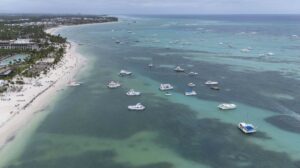Hoteliers request to regulate the use of boats in Bávaro’s coral reef barrier reef
Representatives of the hotel sector operating in the vicinity of Bavaro beach have requested the intervention of the authorities to regulate the number of boats that circulate within a coral reef in the area for the transportation of tourists on excursions.
They denounce that many of these boats travel in the area used by bathers, in addition to the fact that the motors with which they operate would be generating a negative environmental impact in the area, whose coral reef has already been impacted by bleaching, aggravated by the temperature increases in the oceans.
For this reason, Ernesto Veloz, president of the Association of Hotels of the East (Asoleste), said that they have permanently complained about several issues related to motorization and water.
“We have an immense amount of boats; there are excursion companies, which register two and three boats, but they have ten. They take people, dump them on the beach and go and park in front of the barrier reef,” he added
It is not known where the waste goes
He said that it is not known where they take the waste from the boats that have bathrooms, according to Diario Libre.
Both Veloz and Albania Martínez, president of the Association of Aquatics of the Bávaro area, advocate for a study of the load capacity that the Bávaro beach can support.
Martinez informed that the request has been made to the Ministry of Tourism (Mitur), institution that – she said – pointed out to them that free trade cannot be obstructed.
 “We understand that the area is small for the large number of boats operating,” he said.
“We understand that the area is small for the large number of boats operating,” he said.
According to preliminary data from the Association, some 600 boats operate in the area. The excursions usually take place in the vicinity of a natural reef where snorkeling is practiced.
The head of the Bávaro Aquatics Association added that, together with Asoleste, the Navy and other entities developed in 2016 a navigation channel extending to Punta de los Nidos, for the purpose of avoiding accidents with bathers.
“It got out of control and has been tried to resume after the pandemic. Anchorages were made with GPS (…); here there is no marina or dock for maintenance”, detailed Martínez.
He indicated that the most regularized companies take their vessels to Cap Cana and other areas for such purposes.
Deficiencies
For Rita Sellares, director of the Dominican Foundation of Marine Studies (Fundemar), the pollution is a consequence of the poor maintenance of the boats that use two-stroke engines. “The problem is that when they change the oil, they often throw it in the water and then refill it, instead of changing it outside,” she said.
Fundemar works with the assisted reproduction of corals in the country, a work that it develops extensively in the eastern region. When asked if they have noticed any negative impact on these species due to bad practices with the two-stroke engines, he answered: “Some of the pools have not had good results in the assisted reproduction, we suspect that it is due to contamination by fuel or oil. It is common to see oil and gasoline on the surface.”
Source: Arecoa.com

